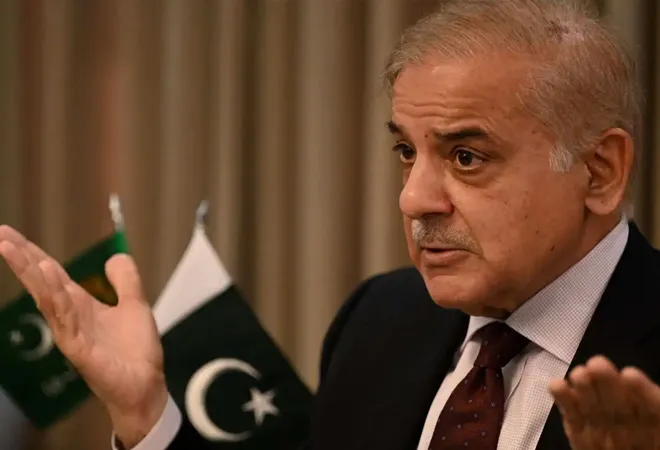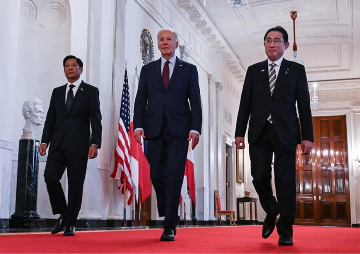
In an
interview with Al Arabiya TV in Dubai, Prime Minister of Pakistan, Shehbaz Sharif, extended a conciliatory gesture towards India by expressing his desire for peace and imploring for “serious and sincere” talks between the two countries. However, this overture was short-lived as within a day, Sharif's office
raked the Jammu and Kashmir (J&K) issue and reemphasised Pakistan's key precondition for renewing negotiations with India: the reinstatement of Article 370. It is well-known to Islamabad that New Delhi may not entertain any discussions regarding J&K, let alone restore its ‘special status’. Thus, it remains unclear what prompted Sharif to extend an olive branch towards India and then issue a clarification, raising doubts about the sincerity of the peace talks offered by Pakistan.
The new Chief of Army Staff, General Syed Asim Munir, has not yet explicitly stated his policy position towards India, apart from provocative remarks on Kashmir, thereby, fueling uncertainty about the revival of the talks.
Furthermore, there are clear differences within the ruling Pakistan Democratic Movement (PDM) alliance government with regard to bilateral talks with India. Some members of the coalition do not seem to align with Sharif's views on the matter. More importantly, the new Chief of Army Staff, General Syed Asim Munir, has not yet explicitly stated his policy position towards India, apart from provocative
remarks on Kashmir, thereby, fueling uncertainty about the revival of the talks.
Despite the effective observance of the bilateral ceasefire
agreement since February 2021, India remains wary of a potential increase in cross-border acts of terrorism originating from Pakistan this year. Therefore, in the absence of formal talks between India and Pakistan, utilising a backchannel dialogue may prove useful in preventing a potentially conflictual scenario(s) between the two countries.
Diversions over sincere efforts
Prime Minister Shehbaz Sharif's proposal for peace talks with India comes at a time when ministers of his own government are actively promoting anti-India propaganda on international platforms. Using the United Nations (UN) as a platform for his diatribe against India, The Foreign Minister of Pakistan, Bilawal Bhutto-Zardari, made “uncivilised”
statements against Prime Minister Narendra Modi in response to India’s Foreign Minister Dr S. Jaishankar's
characterisation of Pakistan as “the host of Osama bin Laden” and “the perpetrator of terrorism”.
The two main political parties of the PDM coalition—Pakistan Muslim League-Nawaz (PML-N) and Peoples Party of Pakistan (PPP)—are displaying conflicting signals regarding the renewal of India-Pakistan bilateral talks. The foreign office, dominated by PPP, is adopting an overly aggressive stance towards India. At the World Economic Forum's annual meeting in January, the Minister of State for Foreign Affairs, Hina Rabbani Khar,
stated that Pakistan does not perceive Prime Minister Narendra Modi as a “viable partner” for promoting peace between the two countries. Additionally, during a recent session of Pakistan's Senate, Khar placed the
blame on the ruling Bharatiya Janata Party (BJP) government and Modi for the present tensions between India and Pakistan. It is noteworthy that Khar’s statements came a few days after Sharif’s talks offer to India.
At the World Economic Forum's annual meeting in January, the Minister of State for Foreign Affairs, Hina Rabbani Khar, stated that Pakistan does not perceive Prime Minister Narendra Modi as a “viable partner” for promoting peace between the two countries.
Since last year, after assuming the office of Prime Minister of Pakistan, Sharif has on different occasions
expressed his desire for peace with India, with the Kashmir issue being at the forefront. In response to Modi's congratulatory tweet on his appointment as the country’s prime minister in April last year, Sharif
tweeted, “Pakistan desires peaceful and cooperative ties with India,” while placing a “focus on the socio-economic development of our people.” Sharif also offered his
condolences to Modi on the passing of his mother, saying, “there is no greater loss than losing one’s mother.” Notwithstanding Sharif’s statements, the bilateral relationship between India and Pakistan has remained stagnant over the past nine months.
Despite India's readiness to restart bilateral trade with Pakistan, the civilian leadership in Islamabad repeatedly failed to take concrete steps to move forward. Former Finance Minister Miftah Ismail
attempted to revive trade relations with India in the aftermath of last year's devastating floods in Pakistan but to no avail. Even former Prime Minister Imran Khan’s commerce adviser, Razak Dawood, had on different occasions
called for the resumption of trade with India. In June last year, even FM Bilawal Bhutto-Zardari
advocated for “economic diplomacy” with India. But expectedly, the foreign office issued a
clarification, stating that Bhutto-Zardari's comments were “being interpreted out of context and portrayed incorrectly.”
Politically, Sharif lacks the political leverage to initiate peace negotiations with India, given the precarious position of his coalition government and the impending elections in Pakistan. Whereas the PPP sees a chance to expand its political influence across all provinces in the country, capitalising on the deteriorating relationship between Imran Khan and the military establishment, as well as the PML-N's waning popularity in Punjab. Consequently, in the midst of the growing political turmoil in Pakistan, the prospect of a formal dialogue with India appears to be a remote and ill-advised notion.
Despite India's readiness to restart bilateral trade with Pakistan, the civilian leadership in Islamabad repeatedly failed to take concrete steps to move forward.
The so-called peace overtures from Pakistan's civilian leadership lack sincerity and are often made to cater to the international audience or to divert attention from the country's pressing issues. Ultimately, any engagement with India will be decided upon by Pakistan's powerful military establishment. In over two months of his leadership, General Munir has largely maintained the
policy towards India established by his predecessor, former Army Chief General (Retd) Qamar Javed Bajwa. Under Bajwa, Pakistan Army agreed to
observe the 2003 ceasefire arrangement on the Line of Control (LoC) and other border sectors since February 2021. While it is expected that Munir may continue to uphold the ceasefire and not disturb the status quo on the borders, cross-border
terrorist activities from Pakistan into India are likely to persist regardless.
Dialogue or no dialogue?
In the absence of a formal dialogue between India and Pakistan, and with no imminent likelihood of one occurring, the use of backchannel negotiations may prove useful in preventing military escalations and managing tensions between the two countries. Minister Khar
claimed that since the PDM government took power in April, there has been no backchannel diplomacy between Pakistan and India “untold to the rest of the world”. While this claim may be
contested, Sharif’s suggestion of the United Arab Emirates (UAE) playing a mediator’s role between India and Pakistan can be explored only to resolve tactical issues. India will not entertain any ‘third’ party involvement in strategic matters like Kashmir.
In April 2021, the UAE Ambassador to the United States, Yousef al-Otaiba,
asserted that his country had played a role in reducing tensions between India and Pakistan, getting their ties back to a “healthy functional relationship”. The statement came two months after India and Pakistan agreed to revive the 2003 ceasefire agreement on the Line of Control (LoC). Maintaining peace along the borders is vital for both countries, especially for Pakistan, which is facing an unprecedented
economic crisis and is on the brink of default. Furthermore, the Pakistani military is struggling to improve its public image, which is currently at a historical low.
Islamabad's fixation on Kashmir does not solve the issues of the local population, and only serves the interests of those in power in Pakistan.
But, more importantly, the people of Pakistan are grappling with escalating
food prices, fuel scarcity, frequent
power outages, and excessive taxes. The PDM government has simply failed to provide crucial economic stability in the country. In such dire circumstances, Pakistan could have benefited from reinstating trade relations with India, a low-hanging option in the bilateral relationship. Nevertheless, all endeavours to resume cross-border trade between the two countries have been
thwarted by Pakistan. Additionally, Islamabad's fixation on Kashmir does not solve the issues of the local population, and only serves the interests of those in power in Pakistan.
India
desires to have “normal neighbourly relations” with Pakistan as long as there is no state-sponsored terrorism, hostility, or violence from the Pakistani side. However, India seems in no hurry to hold bilateral talks with Pakistan. The Narendra Modi government have made several
attempts to improve bilateral relations over the past nine years, but all in vain. Furthermore, the increasing power disparity between the two countries, Pakistan's persistent anti-India stance, and unreliable dialogue offers from the civilian leadership in Islamabad have rendered the relationship insignificant for India. As a result, India may prefer to have limited dialogue with Pakistan, perhaps through backchannel diplomacy with the country’s military establishment.
Conclusion
Sharif buckled under pressure from his coalition partners, the Army establishment, and the Opposition after making talks offer to India. His clarification, followed by an anti-India
statement on the so-called ‘Kashmir Solidarity Day’, rendered the dialogue offer almost useless as India would not make any concessions on the J&K issue, especially reinstating Article 370. Secondly, amidst deepening political and economic crises in Pakistan, the longevity of any formal talks between the two countries seems unlikely in the near term. Moreover, India's
recent invitation for Pakistan to participate in the upcoming Shanghai Cooperation Organization meeting in May should not be perceived as a thaw in bilateral relations. Thirdly, General Munir may need to provide more clarity on his policy on India, which, so far, seems an extension of Bajwa’s policy. Lastly, Pakistan needs to create a “terror-free” environment to hold talks with India. Importantly, Islamabad should understand that these episodic dialogue offers with India do not receive much international traction anymore.
The views expressed above belong to the author(s). ORF research and analyses now available on Telegram! Click here to access our curated content — blogs, longforms and interviews.



 In an
In an  PREV
PREV


